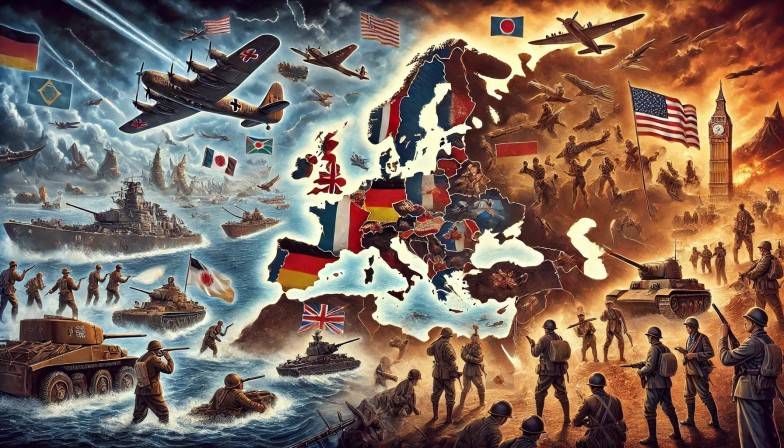War has been a part of human history since the beginning. It has shaped the rise and fall of nations and empires, leaving lasting effects on society, the economy, and everyday life. Understanding the reasons behind wars, their impact, and the different stages of conflict helps us better understand the development of human civilization.

What Is War?
War is a planned and armed conflict that occurs between two or more groups, nations, or states. These conflicts can arise for many reasons, such as political disagreements, religious differences, competition for resources, or the desire for power. War often involves violence, destruction, and fighting, leading to the loss of lives and significant injuries.
The Beginning of War
The history of war dates back to the early days of human civilization. Even when people lived in tribes, conflicts over land, water, food, and resources were common. As humans developed civilizations and formed states, wars became more organized and complex.
In ancient civilizations such as Egypt, Mesopotamia, India, and China, wars played a significant role in shaping political and cultural progress. These conflicts not only determined the rise and fall of kingdoms but also influenced the way societies evolved.
By studying the beginnings of war, we can see how early humans dealt with challenges and how these struggles laid the foundation for the world we know today.
Why Do Wars Start?
Wars often begin due to conflicts over resources, power, or beliefs. Here are some common reasons:
1. Control Over Resources
Nations often fight to gain control over valuable resources like land, minerals, or water. Unequal distribution or scarcity of resources can lead to tensions and eventually war.
2. Political Disputes
Wars can arise from disagreements over governance or political power. Conflicts often occur when different groups or nations have opposing ideologies or systems of rule.
3. Religious Differences
Religious conflicts have historically been a major cause of war. Differences in beliefs and attempts to impose or defend religious practices have sparked many wars, such as the Crusades.
4. Nationalism
When a nation or culture considers itself superior and tries to assert its dominance over others, it can lead to war. Nationalistic pride and the desire for expansion often fuel such conflicts.
5. Revenge
Wars can also start as an act of revenge, where nations or groups try to settle old disputes or retaliate for past conflicts.
Understanding these causes helps us see the roots of conflict and highlights the importance of diplomacy and cooperation to prevent wars.
The Harms of War
Wars cause immense destruction and have countless negative impacts. Here are some of the major ones:
1. Loss of Human Lives

Millions of people lose their lives or suffer severe injuries during wars.
Example: Around 70 million people died during World War II.
2. Economic Destruction
Wars destroy economies, shut down industries, and push people into poverty.
Example: The wars in Iraq and Afghanistan caused severe damage to their economies.
3. Social Impact
Wars tear families apart, force people to leave their homes, and disrupt social systems.
Example: The Syrian Civil War left millions of people as refugees.
4. Environmental Damage
Bombing, chemical weapons, and other war-related activities harm the environment.
Example: During the Vietnam War, chemicals like “Agent Orange” destroyed forests and farmland.
5. Psychological Effects
War leaves deep psychological scars on those affected, especially soldiers and children.
Example: Children in war-torn areas often suffer from PTSD (Post-Traumatic Stress Disorder).
Understanding these devastating effects highlights the importance of working toward peace and preventing conflicts wherever possible.
Types of Wars
Wars can be classified into different types based on their purpose, nature, and scope. Here are some common types of wars:
1. Conventional War
This is a traditional war between two or more countries involving armed forces and direct combat.
Example: (World War I) and (World War II).
2. Cold War
A conflict based on ideological or political differences without direct fighting. Instead, it involves economic, cultural, and technological competition.
Example: The Cold War between the United States and the Soviet Union (1947–1991).
3. Guerrilla Warfare
This is an informal type of war where small groups use tactics like ambushes and raids to fight against larger and more organized forces.
Example: The use of guerrilla tactics during the Vietnam War.
4. Cyber War
A modern type of war where attacks are carried out using the internet and technology, targeting computer systems and infrastructure.
Example: The 2007 cyberattack on Estonia.
Understanding these types of wars helps us recognize how conflicts have evolved over time and how they affect nations differently based on the methods and technology used.
Key Stages in the History of War
1. Ancient Wars
The first organized wars took place in ancient civilizations like Egypt, Mesopotamia, and Greece.
Example: The Trojan War and the Greco-Persian Wars.
2. Medieval Wars
During the Middle Ages, wars like the Crusades and Mongol invasions were significant.
Example: The Crusades (1096–1291), which impacted the Middle East deeply.
3. Modern Wars
After the Industrial Revolution, technology changed the nature of wars with the introduction of cannons, rifles, and naval ships.
Example: World War I and World War II.
4. Contemporary Wars
In recent times, wars have shifted to forms like terrorism, cyberattacks, and proxy wars.
Example: The Syrian Civil War and the Russia-Ukraine conflict.
Efforts to Prevent War
1. The United Nations (UN)
The UN promotes peace and resolves conflicts through dialogue and international cooperation.
Example: UN peacekeeping missions.
2. Treaties and Alliances
Agreements and partnerships between nations help reduce the chances of war.
Example: NATO and the European Union.
3. Education and Awareness
Raising awareness about the importance of peace and the consequences of war helps people value harmony.
Example: Global celebrations of International Day of Peace.
Conclusion
War has been a major, though destructive, part of human history. It has shaped nations but left devastating impacts on humanity and civilization. Promoting peace and resolving conflicts through peaceful means is essential to protect the world from the horrors of war.
More Information: click here

